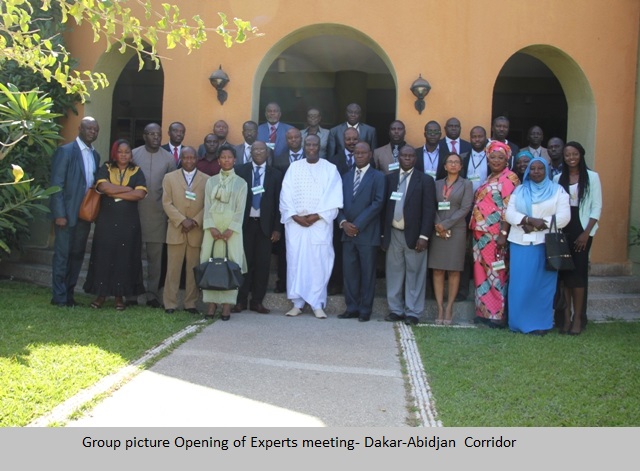| Abuja, 13th April 2016
 Technical Experts from the roads/infrastructure/works/transport sectors and the Justice ministries from seven ECOWAS Member states are meeting in Banjul to assess the feasibility, detailed designs, funding options as well as the appropriate legal framework for the development of Dakar-Abidjan highway. Technical Experts from the roads/infrastructure/works/transport sectors and the Justice ministries from seven ECOWAS Member states are meeting in Banjul to assess the feasibility, detailed designs, funding options as well as the appropriate legal framework for the development of Dakar-Abidjan highway.
The three day Experts meeting which commenced on 11th April 2016 is a prelude to the Ministerial meeting scheduled to take place in Banjul on the 14th April 2016. The Dakar-Abidjan corridor has a high level economic importance in the region and will serve to complete the Dakar-Lagos Corridor which is part the development of a larger continental Trans-African Highways Network (TAH ) being pursued by the African Union.
In a Statement delivered on his behalf at the opening of the Experts meeting, the ECOWAS Commissioner for Infrastructure, Ebrima Njie reminded delegates of the financial, regulatory, design and construction implications of a project of such magnitude and status. In the area of road infrastructure, he noted that there are issues of acquisition of right of way, compensation payments, resettlement, road design and harmonization of standards, construction and supervision, contracting and management amongst others.
In terms of legal matters, the Commissioner tasked Experts to focus their discussion on the preparation of an appropriate project agreement and legal framework that will govern the collaboration among the corridor countries, ECOWAS Countries and Partners and a corresponding institutional arrangement for project development and management. He referred to the existence of several potential financing sources that could be looked once the projects have been adequately prepared.
‘There are therefore critical issues of project preparation, funds mobilization and investment mechanisms and sustainability of financing, capital markets and so on’, He said.
He told experts to be proud of their involvement and feel privileged to be part of the momentous journey of developing a corridor through a first class highway of the type that our leaders envisage in the region and to a large extent on the Continent.
Commissioner Njie praised their collective efforts geared towards contributing to improve the lives of over 300 million inhabitants of the ECOWAS region, and in particular the ordinary travellers and traders who are harassed daily as they travel on the Corridor.
He reiterated that the “ECOWAS of People Vision” squarely depends on the speed and reliability of the movement of persons and goods between Member States and noted that transport could be used as a catalyst for political, economic and social integration, which is a major objective ECOWAS.
The Commissioner therefore urged experts to come up with good and implementable recommendations that will give ECOWAS Ministers and Presidents the right footing to advance this noble project.
In his Keynote address, the Minister of Transport, Works and Infrastructure of the Gambia, Honourable Bala Garba Jahumpa described the meeting as the realization of the dreams of the Authority of Heads of State and Government to construct the Dakar-Abidjan Corridor which is expected to facilitate the free movement of people and trade along the corridor as well as leading to the realization of the self-sustenance and liberalization of the African Continent.
Minister Jahumpa told experts that the potential of the corridor in contributing to the regional integration agenda of ECOWAS cannot be over-emphasized and therefore tasked them to provide a roadmap for the realization of the lofty and laudable aspirations of ECOWAS leaders.
|




